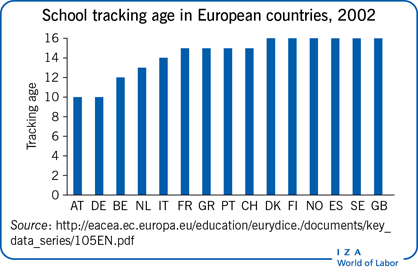Elevator pitch
The goal of school tracking (assigning students to different types of school by ability) is to increase educational efficiency by creating more homogeneous groups of students that are easier to teach. However, there are concerns that, if begun too early in the schooling process, tracking may improve educational attainment at the cost of reduced intergenerational social mobility. Recent empirical evidence finds no evidence of an efficiency–equality trade-off when tracking is postponed.

Key findings
Pros
There is no empirical evidence of an efficiency–equality trade-off when school tracking is postponed.
Postponing school tracking weakens the association between pupils’ educational achievement and parental background, improving social mobility.
Postponing school tracking leads to greater income mobility across generations.
Cons
There is no evidence that postponing school tracking has large effects on average achievement.
Postponing school tracking may increase dropouts among low-achieving students.
Postponing tracking may increase the total cost of the educational system.